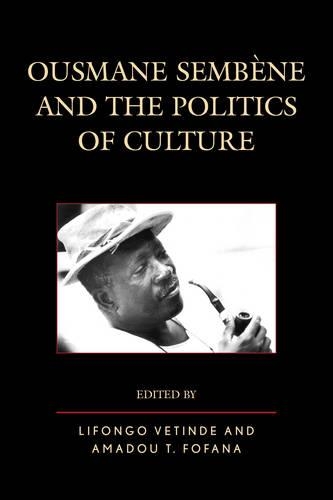
Ousmane Sembene and the Politics of Culture
(Hardback)
Available Formats
Publishing Details
Ousmane Sembene and the Politics of Culture
By (Author) Lifongo J. Vetinde
Edited by Amadou T. Fofana
Contributions by Matthew H. Brown
Contributions by Cherif Correa
Contributions by Lyell Davies
Contributions by Rachel Diang'a
Contributions by David Murphy
Contributions by Mouhamedoul A Niang
Contributions by Augustine Uka Nwanyanwu
Contributions by Dayna Oscherwitz
Bloomsbury Publishing PLC
Lexington Books
12th November 2014
United States
Classifications
Professional and Scholarly
Non Fiction
Political structure and processes
National liberation and independence
848.91409
Physical Properties
Hardback
206
Width 162mm, Height 236mm, Spine 20mm
445g
Description
Undoubtedly one of Africas most influential first generation of writers and filmmakers, Ousmane Sembene's creative works of fiction as well as his films have been the subject of a considerable number of scholarly articles. The schemas of reading applied to Sembene's oeuvre (novels, short stories and films) have, in the main, focused either on his militant posture against colonialism, his disenchantment with African leadership, or his infatuation with documenting the past in an attempt to present a balanced and nuanced view of African history. While these studies, unquestionably contribute to a better understanding of his works, they collectively ignore Sembenes relentless preoccupation with culture in his entire career as a writer and filmmaker. The collection of essays in Sembene and the Politics of Culture sets out to fill that gap as the contributors at once foreground Sembenes fixation on the centrality of culture in the articulation of the discourse of national consciousness and reevaluate his intellectual and artistic legacy within an overarching framework of African liberation. The contributors critically reassess the ideological underpinnings of Sembenes thoughts, his role as one of the foundational pillars of African cultural production, and his relevance in current discourses of nationhood. They do so through a wide variety of interdisciplinary approaches that draw on linguistics, feminist theory, film theory, historiography, Marxist criticism, psychoanalysis and a host of other approaches that give novel insights in the critical analysis of the works under study. In the part entitled Testimonies," a collection of conversations with people who worked closely with Sembene, each of the interlocutors provide illuminating insights into the man's life and work. The variety of themes and critical approaches in this critical anthology will certainly be of interest not only to students and scholars of African literature and cinema at various levels of intellectual and cultural sophistication but also anyone interested in the analysis of the nexus between power, culture, and the discourse of liberation.
Reviews
This collection of essays focuses on the intersection of culture and politics in the work of noted Senegalese writer and filmmaker Ousmane Sembne (19232007). As pointed out in the essays and confirmed in the interviews that close the collection, Sembne rejected 'art for arts sake' in favor of a body of work highly engaged with the cultural, political, and economic concerns newly independent Africa faced. Similarly, the essays highlight Sembnes rejection of Western cultural norms in favor of creating African art for African audiences, as signaled notably by his preference for the use of African languages in his art instead of French. Another recurring note throughout is the tension between Sembne and poet and cultural theorist Lopold Sdar Senghor (Senegal's first president), which resulted from Sembnes opposition to francophonie and rejection of negritude. Taken together, the essays form a coherent collection, and they are soundly researched. The interviews with Sembnes colleagues are especially interesting. A valuable resource for those interested in African cinema and literature. Summing Up: Highly recommended. Graduate students, researchers, faculty. * CHOICE *
This cogent volume, with its multi-faceted framework and interdisciplinary verve, is a valuable contribution to the scholarship on Ousmane Sembene's inimitable legacies. Highly accessible, it points students, scholars and the general readership towards a comprehensive re-engagement of his creative genius and its nuanced relationship to cultural dynamics and social critique. -- Jude G. Akudinobi, University of California, Santa Barbara
With this groundbreaking collection of essays and interviews, Vetinde and Fofana have put together an essential volume for students and scholars of Ousmane Sembene. The volume soars well above other books on Sembene by featuring a smartly assembled cast of incisive scholars and former collaborators of Sembene, all of whom offer unprecedented insight into the literary and filmic work of Sembene. The astuteness and theoretical dexterity of the different essays ultimately turn this volume into a trenchant interdisciplinary analysis of governance, politics, development, identity, gender, and social transformation in postcolonial Africa. -- Ayo A. Coly, Dartmouth College
Author Bio
Lifongo Vetinde is an associate professor in the department of French and Francophone studies at Lawrence University. Amadou T. Fofana is an associate professor of French at William University.
